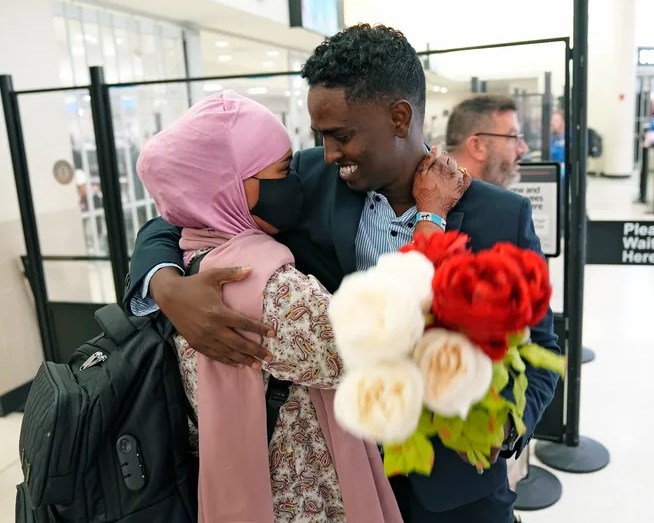The Columbus Dispatch
Danae King
The Columbus Dispatch
Saturday July 9, 2022

While waiting at the John Glenn Columbus International
Airport, Afkab Hussein thought it would still be a few more minutes before he
saw his family when suddenly he felt something crash into his legs.
He looked down to see his 6-year-old son, Abdullahi, had
collided against him, hugging him in greeting.
A smile spread across Hussein's face as he hugged his son
back and looked up, seeing his wife, Rhodo Abdirahman, and their youngest son,
Zain, 2, approaching as well.
It was a permanent reunion that had been more than six years
— over 2,000 days by Hussein's count — two lawsuits, and two trips to Kenya in
the making.
"I'm happy right now," said Hussein, 34, a former
refugee originally from Somalia who now lives in Westerville.
When Hussein arrived in the United States in September 2015,
his pregnant wife was still in the Kenyan refugee camp where they met after
their families both fled Somalia due to civil war.
They had been told that joining their cases after years of
waiting would delay the process even more, but were assured that Abdirahman
could join Hussein soon after he left.
Abdirahman and Abdullahi were set to join him in January
2017, but then former President Donald Trump took office and put bans on
refugee admissions and travel from seven Muslim-majority countries, including
Somalia.
A long fight for
reunification
Although Hussein and Abdirahman have spent most of their
marriage on different continents, it was not for a lack of effort on Hussein's
part.
He has been outspoken when it comes to getting his family
back, traveling to Washington, D.C. and New York to protest and to talk to
officials about his case.
"He did everything to try to get them here —
everything," said Angie Plummer, executive director of Columbus refugee
resettlement agency Community Refugee and Immigration Services (CRIS).
Hussein also joined a federal class-action lawsuit, Jewish
Family Services v. Trump, in hopes of speeding up his family's arrival. The
lawsuit, filed in November 2017, was settled in February 2020 and stated that
the federal government must expedite the processing of Hussein's case and more
than 300 others.
Hussein had hope then, two and a half years ago. He never
lost that hope, talking to his wife and children every day over the phone for
two or three hours as he worked his job as a long-haul truck driver.
He sent them money so they could move out of the refugee
camp and into an apartment. And he visited Kenya twice for months at a time —
once in 2019, when he met Abdullahi for the first time, and again in 2021, when
he met Zain for the first time.
Shortly before the family was set to arrive, elements of the
vetting process that all refugees go through — which includes numerous forms,
DNA tests to confirm familial connections, medical checks and background checks
— were about to expire, so Hussein filed another suit to make the federal
government process the case faster.
Plummer said Abdirahman has probably gone through the
vetting process three times over the years, as different forms expired or security
processes were changed.
"His case got approved and sent back and approved and
rerouted," said Plummer, who helped Hussein join the federal lawsuit and
also file the more recent court order.
Refugee resettlement
numbers remain low
The number of refugees being resettled has been down since
Trump took office, and experts say the intricate public-private partnership
that is the U.S. resettlement system cannot just go back to resettling
thousands of refugees overnight.
There was tremendous hope among advocates that President Joe
Biden would revitalize the system, but he didn't prioritize rebuilding the
program immediately.
Although Biden said 125,000 refugees could be resettled this
fiscal year, which ends on Sept. 30, only 12,641 have arrived so far, according
to Refugee Council USA, a Washington, D.C.-based organization that tracks
refugee resettlement.
Plummer said the federal government's priorities are
elsewhere. Afghans and Ukrainians are being allowed into the country quickly
using a status called humanitarian parole, circumventing the months-long
vetting process refugees go through.
Plummer said she wishes the same would be done for refugees
suffering in civil war in Ethiopia and other nations where they have been
waiting years in camps to be resettled and reunited with their family members.
'So, so happy'
Still, Thursday was a happy day for Plummer, Hussein and his
family.
The smile never fell from Hussein's face, and he was often
seen clasping his wife's hand.
Dressed in a suit, he greeted her at the airport with a
dozen silk roses and, as they moved through the airport to get their baggage,
Hussein kept a constant hand around Abdullahi's shoulders, alternately holding
Zain in his arms or grasping the child's hand.
'No child should be away from their mom':Trump policies make
it nearly impossible for refugees to come to US
At one point, Hussein hoisted the 2-year-old up onto his
shoulders, laughing.
"I feel so happy, so, so happy," said Abdirahman,
25, who is looking forward to going to school to become a nurse.
In anticipation of his family's arrival, Hussein bought a
new SUV and got a larger apartment in Westerville. Still, he said, smiling, his
wife wouldn't let him pick out their furniture without her — that's something
they'll do together.
'All I want is peace':Ethiopians in Greater Columbus fear
for relatives during civil war in Tigray region
Finally surrounded by his family, Hussein beamed as he held
Zain.
"I'm feeling so excited."
[email protected]
@DanaeKing